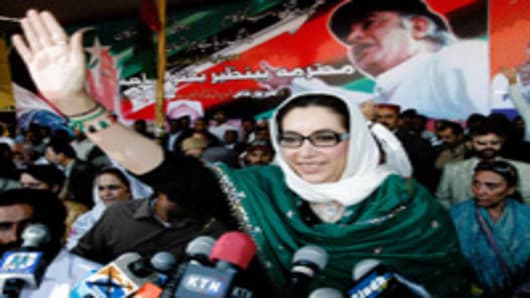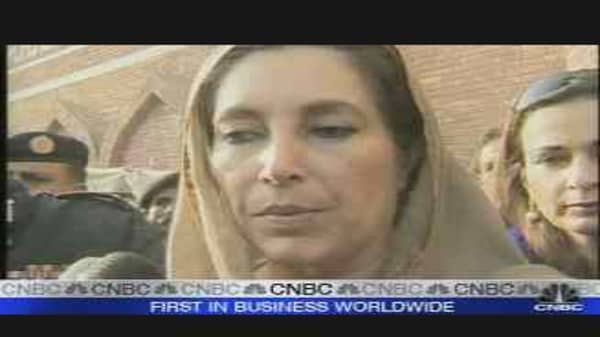The murder of former Pakistani Prime Minister Benazir Bhutto in a suicide attack has thrown Pakistan's political system into turmoil just days before planned parliamentary elections and forced investors to consider the stability of the nuclear-armed country.
World leaders, including U.S. President George Bush, were quick to condemn the Bhutto's killing, which occurred as she was leaving a political rally in Rawalpindi. About 20 people are believed dead from the attack, according to press reports from Pakistan. Bhutto was believed to have been shot in the neck and chest prior to the attacker detonating a bomb, but some reports say she was killed by the bomb's explosion.
"At 6:16 p.m. she expired," said Wasif Ali Khan, a member of Bhutto's party who was at Rawalpindi General Hospital where she was taken after the attack. (Click here to read more about the attack).
Asian markets fell almost across the board Fridayas investors were rattled by the possibility of increased political turmoil in Pakistan and the economically critical region it occupies.
Gold and government bonds rose as U.S. stock markets fell on Thursday after news of the assassination. Gold rallied to a one-month high, reaching $834.70 an ounce. Spot platinum hit a record.
"The jump up we've had in gold has been partly on the back of this news, as it's a destabilizing factor, said William Adams, a metals analyst with Basemetals.com, in an interview with Reuters. "Overall the geopolitical scene has been fairly quiet of late so this is a fresh escalation in the run-up to elections there."
Asian Markets Seen Opening Lower
Asian markets are expected to show a negative reaction to Bhutto's killing, said CNBC's Sri Jegarajah, reporting from Singapore.
The impact could be particularly pronounced in Pakistan's own equity market, which has been among the best-performing in the region. The attack took place after the Karachi Stock Exchange had closed for the day.
Credit ratings agency Standard & Poor's said Pakistan's sovereign foreign currency rating of B+ could be lowered if the assassination was followed by instability, making it more difficult for the country to borrow money in global markets.
"If this assassination ushers in a period of heightened political instability, the ratings will be lowered," John Chambers, chairman of S&P's sovereign rating committee, told Reuters in a telephone interview.
Pakistani five-year credit default swaps, used to insure against restructuring or defaulting debt, widened by around 100 basis points on the news, implying traders felt the country's debt was higher risk.
There were also concerns about the effect the assassination would have on oil markets. Oil rose more than a dollar Thursday, sailing past $97 a barrel, as investors weighed the mounting tensions.
"It highlights the long-term geopolitical issues we face with instability in that region with rising Islamic fervor, which ultimately threatens the oil-producing areas," James Awad, chairman of W. P. Stewart Asset Management, told Reuters. "The most direct effect is the terror premium on the price of oil, which has a stagflation effect on world economies."
Worries about the global situation combined with weaker-than-expected U.S. economic data and weighed on U.S. stocks throughout the day. Shortly after the assassination news broke, data showed new orders for long-lasting U.S.-made manufactured goods rose by a much less-than-expected 0.1 percent during November.
"The first thing is people try to take the safest exit from a lot of different investments and so far that's really been buying euros," said Andrew Busch of BMO Capital Markets. "We had some weak economic data come out today, the durable goods and mortgage applications, so this kind of went right with it. People are buying euros right now."
With the holiday season in full swing, trading volume already was light and there were concerns that this could cause added volatility.
Flight to Safety
"Obviously it is not a good thing ... Anything that destabilizes the area is not good," Art Cashin of UBS Financial Services, said on CNBC's "Squawk Box." "Plus the fact that they have nuclear weapons. Rather than overreact, what you see is people pull back and say 'Let's see how this develops.'"
Analysts say the shock of the Bhutto news triggered a classic capital flight to assets that are considered safe havens in times of geopolitical stress.
"(Bhutto) is just a concern. The move to gold is the flight to safety and quality on the headlines on a quiet, illiquid day," Camilla Sutton, currency strategist at Scotia Capital in Toronto, told Reuters.
-- Reuters and the Associated Press contributed to this report.




